Nowadays when we attend any function, we rarely get to hear Sanskrut Shlokas before the commencement of programmes. But if we were to attend a programme which begins and ends with a Sanskrut shloka, it results in multiple spiritual benefits which we are unaware of. Let us see what are those spiritual benefits with the help of this article.
1. Why is it necessary to recite Sanskrut
shlokas at functions, which one to recite and when?
A. Importance of reciting Sanskrut shlokas
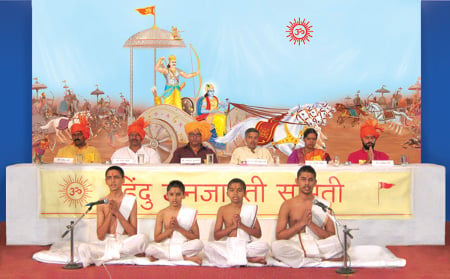
Shlokas are a means of praising and making an earnest prayer to God. Reciting a shloka helps develop humility in ourselves. Through recitation of shlokas, we narrate our problems, sufferings and expectations with bhav (Spiritual emotion) enriched with faith unto God. Shlokas possess Holy power. Through them and the bhav of the one who recites them, Deities are attracted to the earth region and they bestow benevolence. Conversation with God (through an emotion of surrender) through the medium of shlokas lightens our mind, and because of them we also obtain peace. That is precisely why, Hindu culture considers Sanskrut shlokas to be an excellent medium of worship. Besides, Sanskrut is more sattvik when compared with other languages, and since it is a Vedic language, meaning the language of the Deities, Sanskrut shlokas are enriched with Chaitanya (Divine consciousness).
When these shlokas are recited at the commencement, in the middle or conclusion of a programme, they help to increase Chaitanya in the atmosphere, awakening of bhav and alleviating obstacles from negative energies. Thus maximum spiritual advantage can be derived from the programme.
2. Shlokas to be recited at functions on various topics
A. An exhibition related to Spirituality
(For example, exhibition of Holy texts)
1. Shri Ganapati being the Deity of knowledge, nurtures the quest for knowledge. Hence, the following shloka should be recited during the inauguration of a book exhibition.
वक्रतुंड महाकाय कोटिसूर्य समप्रभ ।
निर्विघ्नं कुरु मे देव सर्वकार्येषु सर्वदा ।।
2. The following shloka should be recited in the middle while the exhibition is on.
गुरुर्ब्रह्मा गुरुर्विष्णुर्गुरुर्देवो महेश्वरः ।
गुरुःसाक्षात् परब्रह्म तस्मै श्रीगुरवे नमः ।।
3. The exhibition should be concluded with recitation of the following shloka.
कृष्णाय वासुदेवाय हरये परमात्मने ।
प्रणतक्लेशनाशाय गोविंदाय नमो नमः ।।
वसुदेवसुतं देवं कंसचाणूरमर्दनम् ।
देवकीपरमानन्दं कृष्णं वन्दे जगद्गुरुम् ।।
B. Discourse on Nation and Dharma
1. The following shloka should be recited at the commencement of the discourse.
वक्रतुंड महाकाय कोटिसूर्य समप्रभ ।
निर्विघ्नं कुरु मे देव सर्वकार्येषु सर्वदा ।।
2. The following shloka should be recited in the middle of the discourse.
गुरुर्ब्रह्मा गुरुर्विष्णुर्गुरुर्देवो महेश्वरः ।
गुरुःसाक्षात् परब्रह्म तस्मै श्रीगुरवे नमः ।।
3. The discourse should be concluded with the recitation of the following shloka associated with samashṭi (Society) tarak (Savior) bhav.
सर्वेऽत्र सुखिनः सन्तु सर्वे सन्तु निरामयाः ।
सर्वे भद्राणि पश्यन्तु मा कश्चिद् दुःखमाप्नुयात् ।।
C. Nation and Dharma related rallies
1. When starting a rally for public awakening, recite the following shloka of Adi-shakti (Primal Energy) Shri Durgadevi.
सर्वमंगलमांगल्ये शिवे सर्वार्थसाधिके ।
शरण्ये त्र्यंबिके गौरि नारायणि नमोऽस्तुते ।।
2. While the rally is in progress, in between recite the following shloka to reinforce strength.
अतुलितबलधामं हेमशैलाभदेहम् दनुजवनकृशानुं ज्ञानिनामग्रगण्यम् ।
सकलगुणनिधानं वानराणामधीशम् रघुपतिप्रियभक्तं वातजातं नमामि ।।
3. The rally should be concluded with the assistance of the Absolute Incarnation, by reciting the following shloka.
कृष्णाय वासुदेवाय हरये परमात्मने ।
प्रणतक्लेशनाशाय गोविंदाय नमो नमः ।।
वसुदेवसुतं देवं कंसचाणूरमर्दनम् ।
देवकीपरमानन्दं कृष्णं वन्दे जगद्गुरुम् ।।
D. Programmes related to Nation and Dharma
(For example, a Hindu unity meet)
1. Commence the programme with the following shloka.
कृष्णाय वासुदेवाय हरये परमात्मने ।
प्रणतक्लेशनाशाय गोविंदाय नमो नमः ।।
वसुदेवसुतं देवं कंसचाणूरमर्दनम् ।
देवकीपरमानन्दं कृष्णं वन्दे जगद्गुरुम् ।।
2. After the interval, before the commencement of the next session, recite the following shloka.
कर्मण्येवाधिकारस्ते मा फलेषु कदाचन ।
मा कर्मफलहेतुर्भूर्मा ते संगोऽस्त्वकर्माणि ।।
3. Conclude the programme by reciting a shloka that bestows the spiritual experience of Shanti (Serenity) and God’s Nirgun (Non-materialized) Principle.
ॐ सह नाववतु । सह नौ भुनक्तु । सह वीर्यं करवावहै ।
तेजस्विनावधीतमस्तु मा विद्विषावहै ।। ॐ शान्तिः शान्तिः शान्तिः ।।’
– A Scholar (Through the medium of Mrs Anjali Gadgil, 9.12.2006)

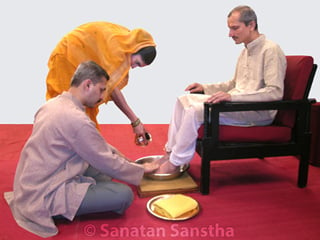 Do you know the correct way of doing Felicitation ?
Do you know the correct way of doing Felicitation ?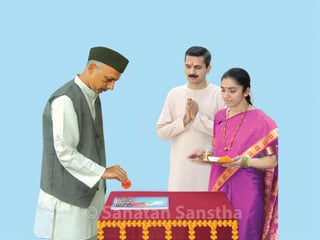 Book Release : How to do it Spiritually?
Book Release : How to do it Spiritually?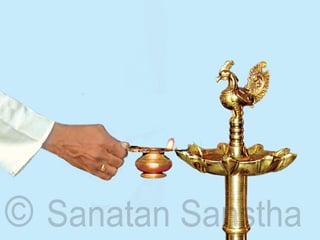 Importance of lighting the lamp in functions
Importance of lighting the lamp in functions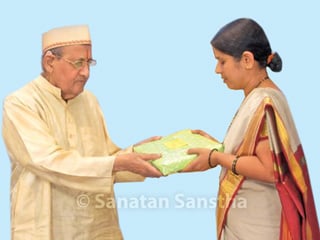 Presenting a gift
Presenting a gift